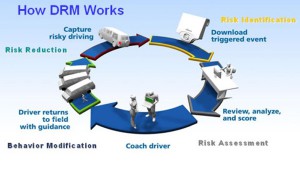 Taking the EOBR mandate even further, the company Lytx has announced that their video camera system for commercial motor vehicles has the potential to reduce crashes by up to a third annually. According to the Virginia Tech Transportation Institute’s recent study of these forward and driver facing video camera systems, 20 percent of truck collision fatalities from 2010-2012.
Taking the EOBR mandate even further, the company Lytx has announced that their video camera system for commercial motor vehicles has the potential to reduce crashes by up to a third annually. According to the Virginia Tech Transportation Institute’s recent study of these forward and driver facing video camera systems, 20 percent of truck collision fatalities from 2010-2012.
Lytx’s handout states that 90% of truck crashes are results of human error from speeding related, inattention, operating the vehicle in an erratic manner, failure to keep in proper lane, or failure to yield right-of-way. Lytx’s DriveCam system works to help prevent these crashes by having two cameras inside the truck, one facing the driver and once facing the road. The footage of all sharp breaking events are then uploaded to the wireless network. Like the EOBR, only a specified amount of time on either side of the breaking event is uploaded. If the breaking event causes or is a result of an actual crash then the footage can be used to help understand what really happened. If not, the trucking company is still able to look over footage of the event to provide the driver with information to hopefully prevent further sharp breaking incidents. Lytx touts that this will lead to much more informed and safe truck drivers. Lytx also recommends that their DriveCam should be used in driver training programs before the truckers are actually out on the road.
Although the reduction of truck collisions and fatalities seem like a positive step, I cannot see truck drivers being willing to install cameras in all of their trucks. If truckers are speaking up against EOBRs being mandated in their vehicles, I feel that they will see cameras as an even greater invasion of privacy. From the responses from drivers on this article it is easy to see that they enjoy the independence of their career and installing cameras to watch all of their movements takes away any sense of that freedom. I do see however the benefits of the DriveCam in training programs and could see their use their as a compromise between trucking companies and their drivers.
Source :
http://www.overdriveonline.com/study-touts-benefits-of-in-cab-camera-system-with-paired-driver-training/
http://info.drivecam.com/rs/lytx/images/Lytx-Infographic-LivesSaved-0514.pdf
Images:
http://images.businessweek.com/ss/09/04/0408_cars_go_wireless/15.htm
http://www.covplus.com/news/2013/4/24/crum-forster-to-offer-drivecam-services-to-policyholders.html
Yeah… I don’t know how I would feel about someone constantly watching me while I drive. Probably wouldn’t allow it in my car
From what I could tell, no one is actually constantly watching the video. The footage only gets uploaded to the server when there is a sharp breaking incident and only the few seconds before and after.
A substitute to the cam could be the black box system used in planes. The box could gather audio from inside the truck as well as other information from sensors installed strategically inside the truck. A similar sensor to the one we saw at the bike’s seat could be installed in the steering wheel to monitor if the driver ever stops holding it.
I don’t understand how this camera would decrease the amount of crashes on the road. Most drivers know what caused them to crash. Would seeing your crash on camera really make you more aware for next time? Let’s say they fell asleep at the wheel. Would watching yourself close your eyes and then crash on camera make you fix it for next time? I’m pretty sure the driver knows he fell asleep and already knows not to do it for next time.
I think the thought was that having a camera watch you while driving would make you want to be more on top of your game. I wouldn’t want my supervisors to know the reason I crashed was because I fell asleep. This only goes so far though as we heard at UMTRI, at some point the effect of having a camera in your car on your driving skills wears off because you just get used to it.
I do see the positive benefits of this technology in giving analysts data to scrutinize in order to better understand what caused these crashes. The data once gathered could be used to find ways to prevent fatalities, be that through design changes within the car, new technologies in trucks driving mechanisms, or through better driver training. However, the camera also poses a liability for trucking companies, these videos could then be used by those injured in a truck accident to come after the trucker and the company for which an individual works.
Your comment reminded me of what the alumni said about the EOBRs in terms of truck crashes. She was telling me that most of the time she likes having the recording available and can use it to defend her driver, but that the EOBR doesn’t lie. If what it shows is not in favor of the trucker or the company, there isn’t much she can do.
In Russia cars routinely have cameras front and rear (cf. the footage from the meteor a few years back). That’s to have evidence in the case of an accident, and perhaps for other purposes….lots of online discussion, go look?!